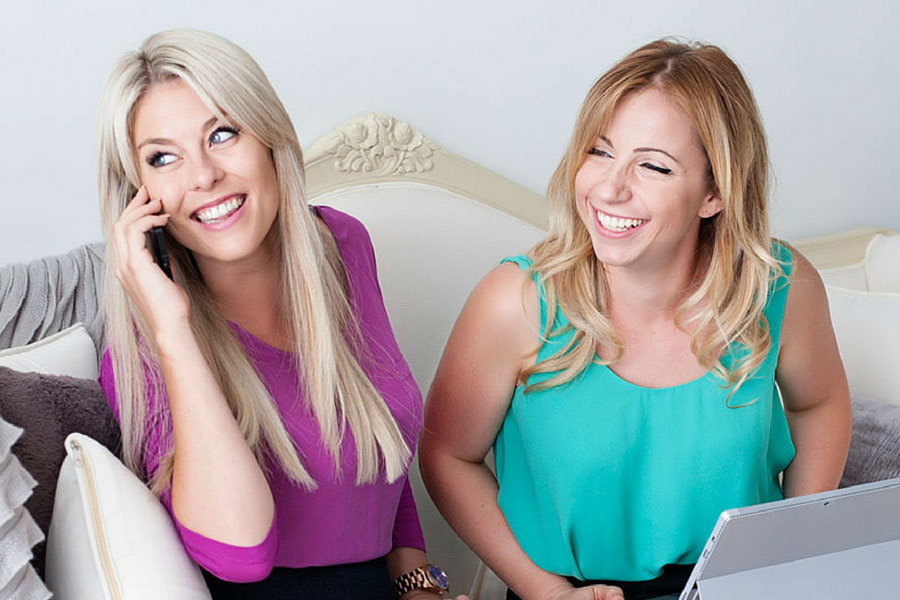It was never my intention to disrupt the male dominated ride-sharing industry. Working several part time jobs and struggling with four teenagers still at school, I realised there must be a market for women like me. Women like me who have a car, have the time and desperately need more financial independence and flexible work arrangements. Women like me who are too afraid to drive men around at night, and women like my eighteen-year-old daughter who had had her fair share of bad experiences in taxis and ridesharing services. I thought about the Pink Cabs concept in London and knew nothing like this had been created in Australia. So I decided I would create it.
Be the creator – not the consumer
To grow wealth, you have to think like a creator, not a consumer. We are conditioned from such a young age to think about what we want to buy, instead of what we want to create. I like to pose the question to young women in schools – why not be the creator of Instagram, instead of the subject of Instagram? It’s important to keep asking yourself – what business can I start that solves a need or a problem, or improves a situation?
A good place to start is with what you’re already consuming. For example, are you following any blogs? Would you be interested in starting your own one? Do you love reading books? Perhaps consider starting a book club! Making these small changes will put you into a more creative mindset, allowing you to think critically about what you can create in day-to-day life.
I like to pose the question to young women in schools – why not be the creator of Instagram, instead of the subject of Instagram?
Maximise your financial wealth
Women often feel guilty for thinking about their own financial independence – they exclude themselves from following the money to maximise their wealth and are not taught financial independence. If an opportunity arises or you think of an idea, follow the money and go for it! You can take the driver’s seat for your future. Caring about your financial growth and professional career does not mean you don’t care about people and want to make the world a better place. I know from my time as a comedian, there’s nothing worse than feeling you have not had a crack.
Instead of making drastic changes to your spending, start small to maximise your wealth. Buying a coffee every day? Try every two days instead. Going out to dinner twice a week? Cut down to just one a week. The small things really do add up. On top of this, you should diversify your investments. It’s important not to put all your eggs in one basket in case something unexpected happens, and exposing yourself to different assets will help you make gains for your financial future.
Be unapologetically you
We all know how the saying goes – fake it until you make it, right? Faking it can be a good way to get your foot in the door, but when it comes down to it, being yourself is what will get you where you want to be. I learned during my time on radio that if I was thinking or feeling something, it’s highly likely others share those feelings. So, if you want to be a game changer, there’s no point in pretending to be anyone else but yourself, as you will always find people who share your vision and appreciate you for who you are. It’s you who will win people over, and being uniquely yourself is what will grow your business and set you apart.
‘Courageous conversations’ have gotten me where I am today. This means confronting issues head on and saying what I feel. Whether it be at work or at home, it’s important to feel like you’re being honest. Think about what you want to achieve before having these conversations and go in with a plan. Perhaps write it down or practise what you want to say. This will ultimately lead you to be more open and transparent in your home and work life.
Create what you want to see
I created Shebah because I was sick of hearing my daughter and her friends speaking about their terrible experiences in taxis and ridesharing services. I was tired of working four jobs with no flexible work and I wanted other women to have the financial independence to live their lives. If you have your heart set on creating and making a change, there’s no point in creating something you think others would want but wouldn’t use for yourself. You need to be completely invested in your idea to see it come to life.
Begin by thinking about the bigger picture and the world you would want your children to live in. Do you want less food wastage in the world? Start by thinking of ways to tackle your waste at home. Do you want better education for your children? Think about what you would do to change it. It won’t happen instantly, but thinking like this will lead you on the path to a game-changing idea.
Surround yourself with amazing people
Breaking ground in a new field and starting my own business has been gruelling. What keeps me motivated and keeps me sane is the people I surround myself with. The staff that work with me are so extraordinarily committed – everyone is devoted to keeping both our drivers and passengers happy and care so deeply about the success of the business. Surrounding yourself with extraordinary people is what will help your business and you thrive, particularly when times are tough.
Linkedin is great tool for building strong connections between likeminded individuals, thought-leaders and people in your industry that you share interests with. When using tools like Linkedin ask questions, share knowledge and look for upcoming events and opportunities inside and outside your circles. It’s important to get in touch with people in your industry or the one your aiming for, to build long-lasting connections and work toward your professional goals.
 George McEncroe is the founder of the all-female ride sharing service, Shebah, which has now completed over 18,000 trips and accredited over 850 drivers since its launch in 2017.
George McEncroe is the founder of the all-female ride sharing service, Shebah, which has now completed over 18,000 trips and accredited over 850 drivers since its launch in 2017.



 Tanya Dontas is Co-Founder and COO of
Tanya Dontas is Co-Founder and COO of 
 Karen Gately is a leadership and people-management specialist and a founder of Ryan Gately. Karen works with leaders and HR teams to drive business results through the talent and energy of people. She is the author of The People Manager’s Toolkit: A Practical guide to getting the best from people (Wiley) and The Corporate Dojo: Driving extraordinary results through spirited people. For more information visit
Karen Gately is a leadership and people-management specialist and a founder of Ryan Gately. Karen works with leaders and HR teams to drive business results through the talent and energy of people. She is the author of The People Manager’s Toolkit: A Practical guide to getting the best from people (Wiley) and The Corporate Dojo: Driving extraordinary results through spirited people. For more information visit 

